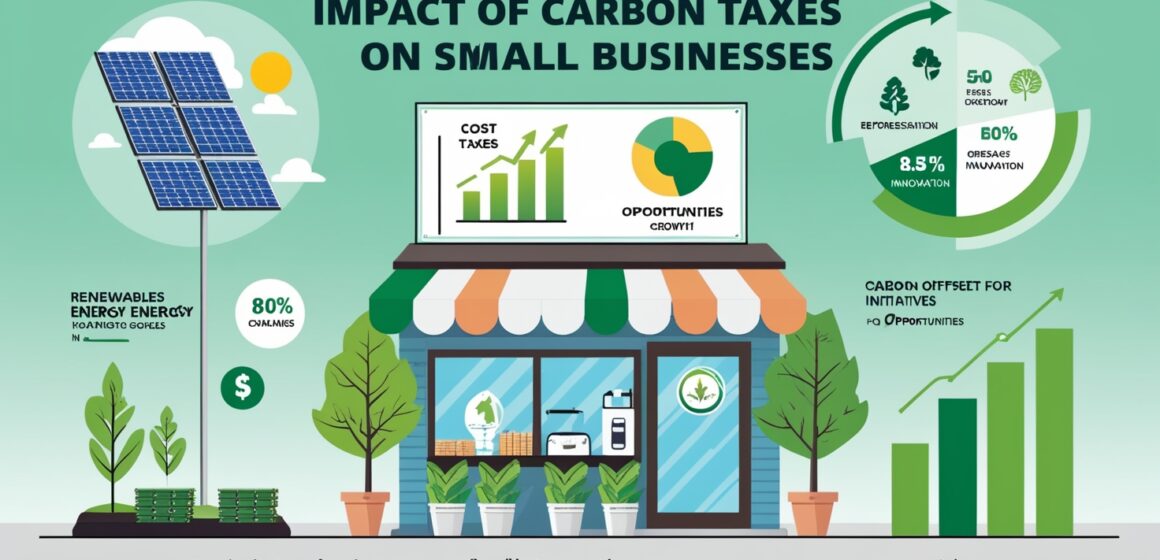As climate change continues to dominate global discussions, carbon taxes have emerged as a key economic policy tool to reduce greenhouse gas emissions. While the concept may seem daunting, particularly for small business owners, understanding carbon taxes and their implications can help businesses navigate this evolving landscape effectively.
What Are Carbon Taxes?
A carbon tax is a fee imposed on the carbon content of fossil fuels, such as coal, oil, and gas. The primary aim is to encourage businesses and individuals to reduce their carbon emissions by making environmentally harmful activities more expensive. By putting a price on pollution, governments hope to incentivize greener practices and technologies.
Why Do Carbon Taxes Matter for Small Businesses?
- Cost Implications:
- Small businesses that rely heavily on energy-intensive processes or transportation may face increased operational costs. For example, higher fuel prices can impact logistics and delivery expenses.
- Indirect costs may also rise as suppliers pass on their own increased expenses to customers.
- Opportunities for Innovation:
- Carbon taxes can drive innovation by encouraging businesses to adopt energy-efficient practices or invest in renewable energy solutions.
- Small businesses that proactively reduce their carbon footprint may benefit from tax credits or subsidies linked to green initiatives.
- Consumer Preferences:
- With growing awareness about climate change, many consumers prefer brands that align with sustainable practices. Businesses that embrace eco-friendly policies may gain a competitive edge.
How Small Businesses Can Adapt
- Energy Efficiency:
- Conduct energy audits to identify areas where energy use can be reduced.
- Invest in energy-efficient appliances, LED lighting, and better insulation to cut down utility bills.
- Transition to Renewables:
- Explore options for using solar, wind, or other renewable energy sources.
- Check for government incentives that offset the cost of transitioning to clean energy.
- Offsetting Carbon Emissions:
- Participate in carbon offset programs by investing in projects like reforestation or renewable energy development.
- Use offsets as a way to mitigate unavoidable emissions while transitioning to greener practices.
- Rethink Supply Chains:
- Collaborate with suppliers who prioritize sustainable practices.
- Optimize logistics to reduce fuel consumption and emissions.
Benefits of Carbon Taxes for Small Businesses
While carbon taxes may seem like an added burden, they can also present long-term benefits:
- Cost Savings: Energy-efficient practices often lead to significant cost savings over time.
- Brand Reputation: Businesses that champion sustainability are likely to attract eco-conscious customers and partners.
- Market Opportunities: Offering green products or services can open up new revenue streams and customer segments.
Challenges to Consider
- Initial Costs:
- Implementing energy-efficient technologies or transitioning to renewable energy sources may require upfront investment.
- Knowledge Gaps:
- Many small businesses lack the resources or expertise to navigate environmental regulations or identify cost-effective green solutions.
- Market Dynamics:
- Fluctuations in energy prices and demand for green products can impact profitability.
Policy Support for Small Businesses
Governments often implement measures to ease the burden of carbon taxes on small businesses. These may include:
- Subsidies and Grants: Financial support for adopting energy-efficient or renewable technologies.
- Tax Rebates: Reductions for businesses that meet certain sustainability benchmarks.
- Advisory Services: Access to resources and guidance on navigating carbon tax compliance.
Conclusion
Carbon taxes represent both a challenge and an opportunity for small businesses. While they may introduce initial costs and complexities, these taxes also incentivize innovation, efficiency, and sustainability. By understanding and adapting to this policy shift, small businesses can not only mitigate risks but also position themselves as leaders in the transition to a greener economy.




Leave a Reply